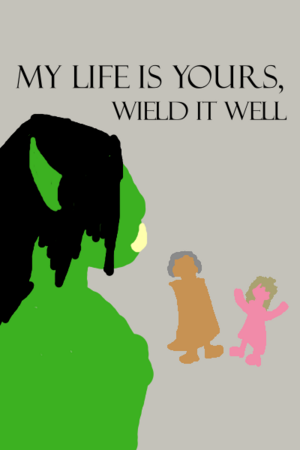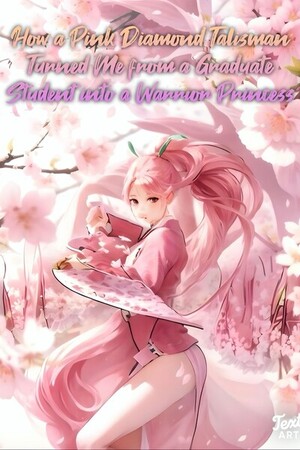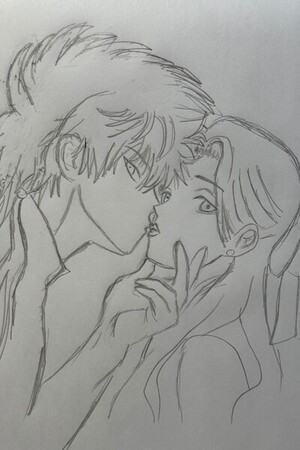Chapter 6:
A Lord’s Will and Testament
My Life is Yours, Wield it Well
Ol-Lozen and Daigay completed their journey to the royal palace on foot, much to the dismay of Mouse.
Its allure, compounded by fables of political intrigue and courageous young knights who’d distinguished themselves knelt before noble figureheads, had filled her head with flights of fancy. She’d hounded their departure with pleas and assurances of being quiet as her namesake. The baker was an acquaintance of Daigay; she had enchanted his oven to burn hotter and distribute its heat more evenly, and extended to his gloves and tools the same protections against heat her right arm’s covering held. He was more than keen to keep an eye on the wailing girl and their possessions in the interim.
Lord Larkhen the Second’s palace had been built not in the expected center of the city but at its eastern end, far from the gates, cresting a hill that had since been encased in clay red bricks and smoothed, giving the appearance of a pyramid without a point, the palace looming at the apex. A wide, stone staircase built into pyramid’s side provided the means upward. If the walls were breached, an army would need fight through Larkhen’s Hold in its entirety, street to street, giving archers positioned on rooftops ample time to whittle down approaching forces, before the foe beheld the palace in all its glory, and then despairing at the sheer effort required to continue fighting uphill towards what proved a fortress in its own right.
Ol-Lozen appraised the rectangular tower shields of what guards patrolled. Ostensibly, a phalanx would take position at the top of the pyramid, shields locked together, between the stairs and open courtyard where the one gate stood, as high walls and battlements made a killing field for opponents foolhardy enough to launch an assault around the rear, flank, or sides. An effective plan of defense, however it demanded egregious military resources to function, resources better spent defending the city’s outer wall. But the first Lord Larkhen, at a time when soldiers were plentiful, had envisioned his final staging point – the last bastion midst the chaos of a city under siege – and refused his mind turn.
In this day, in this age, the palace stood bare. A footstep in one corner of the empty flat courtyard echoed through to another. If all present soldiers locked shields to fortify the gate with muscle and sword, there would remain perhaps a dozen pairs of hands for longbows. A waste, Ol-Lozen thought, this ostentatious display will topple if a foe so much as breathes in its direction. As if hearing his critique the gatekeepers snapped eyes on him, glaring through slitted visors.
The lord’s herald sprinted across the courtyard huffing and puffing, his round face crimson and dripping wet. Lighter dress he wore as opposed to the guards who roasted under the midday sun in full plate. Dark stains marred his tabard. He bowed swiftly, then bowed again, spattering the ground and the new arrivals with sweat. Ol-Lozen wiped droplets of the boy’s perspiration from his green hands, half-listening to him pant his way through a royal proclamation, unintelligible like usual. It was beginning to chafe him, this language barrier, though he doubted the problem would alleviate any time soon. Daigay’s expression soured when the herald finished, and she motioned for Ol-Lozen to follow her when the boy turned back to the palace.
“Lord Larkhen… the Second…” she panted, mockingly, “has graciously accepted your request… for audience.” Her gaze bore a deathly heat. “Keep quiet and our time here will be mercifully short.”
The inner palace was a maze of well-lit hallways, lanterns, pillars, and wood panels, ceiling sufficiently high that Ol-Lozen could stand straight but low enough to force him stepping sideways every few feet lest his sword’s handle bang the chandeliers. He felt a strange sense of responsibility not to embarrass himself – or Daigay – and endured the stares of palace servants as he awkwardly tangoed his way through the halls.
At last they reached their destination: a heavy oaken portal banded with iron and brass, given knockers modeled after the jaws of bears. The herald grabbed a metal loop between one’s teeth and slammed it down signaling their arrival, stepping back to await acknowledgement. Ol-Lozen inhaled a slow gulp of air, released warm breath in a steady stream; one more for good measure; another for peace; the fourth came out ragged, and he was startled to feel his chest shake. The Orkan heart thrashed the walls of its bone jail. Worry slid up his spine like a venomous snake.
Worry?
What was there worth worrying over? He had his instructions, his orders, assurance that this formality would end in short order, yet he felt uneasy all the same. His clothes clung too tight, and fabric once comfortable now itched him terribly. Oil lathered his hair like soap. A rank smell touched his nose; horror of horrors – it was him! It had been two – no, three days! – since last he’d bathed, and the thought curdled like bad milk. You’re thinking too much.
“Hold my arm, deary.”
Ol-Lozen blinked at the sound. What had reached his ears was a voice tender with years, softened by time and trial, cutting through the anxious fog.
He looked down and saw Daigay hunched over, left hand pressed into the base of her back. Her bandaged arm held high. She wiggled her fingers, grasping for something. She sighed, and angled her head to meet Ol-Lozen’s perplexed gawk with a groan of extreme effort. Her jaw hung slightly loose, as if the muscle had gone slack, and she smacked her lips, pink tongue flashing to accentuate the noise’s wetness. Those minor changes had added thirty years, replacing the obstinate magus with an old crone in need of help crossing the street. Light breeze would knock her over and shatter every bone in that old body.
“Take your elder’s arm, you twit.”
When the doors opened to the throne room, all present witnessed an Orkan assisting the old woman on her journey, feet shuffling across the tiled floor as they approached the lord of Larkhen’s Hold. They walked on polished marble arranged in patterns of white and black diamonds, like the floor of a massive chess board, though the pillars occupying each quadrant required new layers of strategy, new ways of forward thinking, before each side’s pieces were hopelessly obstructed by the stark red supports.
The lord’s throne, taken from the same rock, was positioned at the head of the board, and the lord occupying it sat arrow-straight and formal. He wore a crown of simple gold, no jewels inlaid that Ol-Lozen could see, rigorously curled ash brown hair providing a cushion, thin rivers of grey marking his age. His skin was bronzed by the sun, and the length of hair from lip to chin had yet to suffer his hair’s grey touch. A trio of soldiers stood on each side, greatsword no shorter than their body for each man.
Adjacent to the throne was a thin, brown-robed man, pale as milk, with but a ring of white fuzz remaining to call hair. He appeared older than the lord, perhaps even older than Daigay. Written across his right hand were familiar smoky runes, and Ol-Lozen’s throat reflexively tightened. Another damn magus.
The herald passed by Ol-Lozen and Daigay with ease, and spoke with recovered voice, his words translated by the latter.
“Lord Jad Larkhen the Second, Scion to Our Empress Attendant, and Caretaker to the Freeborn Lands,” she cooed, using that doting voice that ran incongruent with the Daigay he knew. No small amount of heat bled through her clothing. She had removed her glove, exposing her runes as “evidence” of ownership over her Orkan help, so each pat on his arm was accompanied by the draft from a furnace.
“Are you ill?” he asked.
“No,” she replied, “I’m Daigay!” She drew back her head and laughed; the sort of laugh where each squeaky bray of joy, like a hinge in need of grease, necessitated preceding each burst with deep gulps of air. Rather a donkey’s laugh than a person's, unless that person was ancient, gummed their meals, and huffed paint predating safety regulations. To Lord Larkhen, she bowed her head. “This humble servant has answered your summons.”
Seeing the magus had summoned before, she spoke in Ol-Lozen’s tongue – a considerate choice – and judging from the flash of anger across the Lord Larkhen’s mien, also a poor one. With a cough to clear his throat, the old court magus replied –
“Yes. You is... Slave. He, Orkan, your summoneds?”
– with pronunciation so broken no amount of gold mortar would pretty up the whole. If the throne room were any quieter one might have heard the laughter’s snicker in Daigay’s brain. Her whole body vibrated with amusement.
From there, the meeting only went downhill. Compared to Daigay, this magus spoke like a child. Worse than a child. His education left gaps the size of countries. He used words not befitting the situation, dropped verbs, spoke in incorrect tenses. He had taught himself what he believed was important, not what was crucial. And in the half-minutes leading up to another display of butchery he would grope in the air for words, count his knuckles, or tap the stone with his toe, communicating some faulty mnemonic device for the Orkan tongue. He and the lord would row back and forth, again and again, one trying to relay information, failing, restarting, failing again, then finally asking a question that only unearthed new flaws in the previous six.
When he could take no more buffoonery the king sliced the air with his hand and shouted words that made Daigay flinch. The magus spoke, now in his language, and Ol-Lozen was once again left in the dark.
“Lord Larkhen commands you speak in the birth tongue of our people. This demonspeak offends his presence, and use of such deplorable language places question on both our intentions.”
Daigay’s head swung from the magus to Ol-Lozen, seemingly in panic. “But how will he know what you ask of him?”
“That is no concern of the lord, neither should it be concern of yours.”
“But my help –”
“Your liege has spoken, magus. Cease use of the tongue, or yours is forfeit.”
“If Lord Larkhen demands it,” she sniffed, staring at the ground. “Might I beg of the liege water for this one’s dry throat? Talking has parched me.”
The Orkan stood there, stiff as a statue, sweating under the throne room’s torches while his fate lay in the hands of another, no awareness of proceedings. His mind drifted to Mouse. The tiny girl would have found this all quite boring, but, of course, she’d have laid bare the truth of his master immediately. At day’s end, she had drawn the deal’s better end by remaining under the baker’s care, for everyone involved. Without churlish interruptions the conversation continued apace, headway in whose favor only Daigay would know, and she had already been warned to speak plain. Unengaged, Ol-Lozen’s mind wandered, eyes growing leaden with sleep, and his tongue poked at the bone protrusion within his mouth, still wet, the tusk exposed beyond his lips drier than preferred. Air and exposure were bad for teeth, doubly bad for tusks, which, at the most essential level were elongated teeth equally susceptible to decay. Nightcaps for protecting one’s tusk health had been cheap and plentiful, available on every corner store pre-filled with nutrient gel. Here they may as well have been buried on the moon in a padlocked box.
At the sounds of wild shouting Ol-Lozen broke from his reverie. The lord’s purple face was a mask of fury. Daigay had shrunk, retracted into the shell of her cloak like a turtle. Before the chains found their mark he caught a blur of motion, a shimmer like summer heat, then the cool tile expanded in his vision faster than he could blink.
Painful lights exploded as his head slammed against the stone, his cheek taking the brunt of impact in place of his tusk, saved by turning at the last moment. Dust rained from the ceiling with his roar, ears not protected by clasped hands ravaged. He struggled against his shimmering chains but they were forged by will, by old magic, and brute strength alone would not break their links. The doors of his mind were flung open. Fear flooded in, submerging his thoughts in brackish water.
He craned his neck looking for help, looking for Daigay who had brought him into this trap, and saw the guards approaching. Creaks behind him and a rush of air told him the doors to the throne room were open as well. More hands clad in armor were approaching, and the quiet gleam of blades. If only he could reach his own; it was there, behind his head.
With a few inches more he might jab the handle with his nail, catch the textured surface, lift that way. What cost was a fingernail for freedom? Two? Three? Inches were simple. The chain was unyielding: his arm was not. It could be pushed through, split; like wedding cake; down to the bone, and one prayer further. It would have to be enough.
“The stone has been cast. Fine, then.”
Ol-Lozen stops his struggling, as do the guards their approach. The voice that rang through the throne room was one with the sharpness of a whip, disguised no longer with crooning and helplessness, and rejected the lord’s demand for familiar tongue. A shadow slithers across the not-man’s body. With a snap of her fingers his bonds shatter like sugar glass.
“The lord of bears packs his jury with the beasts. The base for a good joke, I’m afraid, but his timing was atrociously chosen.”
Rubbing circulation back into his limbs, Ol-Lozen stood again. More than one soldier took a step back. Their swords were still sheathed, though for how long Lord Larkhen would keep them that way was unclear. From how he and his defeated magus trembled, not for long.
“Now what?” asked Ol-Lozen. He contemplated drawing his own blade, not wanting to be caught flat-footed at a time the outcome would be decided by who moved first. Daigay’s calm kept steady his hand. She stood straight-backed to the lord and his court recognizable again, her senile act thrown off.
“We depart. Our time here has come to an end.
“Somehow I doubt we’ll be allowed to leave.” Six guards were in front, and two more were positioned between them and the room’s door. “Have you changed your mind on not denying royals?”
“That was before he tried to conscript you.” She swirled the water around in her cup. She took a small, thoughtful sip. “They’re flagging, I’m sure you’ve noticed, in need of numbers, and he judged the price of an elderly magus’ inconvenience worth the rewards of demon service.” A curt retort cracked through the throne room, and Daigay bent to the polished stone that had cracked from the blow her heel had dealt. In her palm shined the prize of royal vandalism: a sliver of the floor’s white tile, which she immediately clenched within her fist.
“Three hot meals a day, living quarters, payment, lands if you live long enough to claim them, titles if you’re impressive – and you are impressive, Orkan, believe you me. You might have tasted a good life chained to this fool’s hand. Tempting, no?”
At that moment he tasted salt. The finger that brushed his lips came away damp, and he grasped the air was growing hotter. Smoke singed his nostrils. He squinted as the flames clutched by their braziers leapt higher, polluting the air with burning wood.
“I’ve come to prefer the life I’ve found under you and Mouse.”
“She’ll be gladdened by that. After today, your service to her will become indefinite.”
Lord Larkhen, rigorous to tradition, bellowed at his guards, and every sword sang to readiness. Ol-Lozen’s hand flew to his own, but stopped when Daigay replied –
“No, I don’t think so.”
– and the throne room rang with the shouts of men, the clatter of swords flown from hands, and the crash of armored bodies pummeled to the stone by imperceptible force. There had been no shimmer, so smell, no wave of hand or staff. Not a drop of blood remained in the face of the lord or his magus, and both were struck dumb.
Then the guards began to scream.
“Good on you for the leather boots. Metal conducts heat too well for my purposes.” Daigay turned to Ol-Lozen, and even as the stone upon which he stood rose to greater, discomforting temperatures – blistering for those clad in steel – and the room blossomed a scent of pork, he felt an icy finger caress his throat. Warping Daigay’s face was the sleazy tooth-filled grin of a dog that had passed a silent fart, and was relishing in her owner’s gags. She inhaled the throne room’s intoxicating tumult.
“This palace can be a real labyrinth when you haven’t the foggiest of its layout. I hope you committed our journey to memory.” She opened her fist for him to see: the sliver of floor, burning white-hot in her bandaged palm. Stranger was the cup she held – condensation had formed on its surface, the drops freezing to crystals of ice before his eyes.
When Lord Larkhen squealed from the pain of his burning throne, she dashed the cup and its contents to the floor, and as the throne room was plunged into darkness, Ol-Lozen endured to his face the condensed slap of a wet towel.
“Follow the light if you wish to live.”
What light? All vision had been swallowed by her spell, and not only light but heat as well; no longer did the floor burn. What shouting now came not from pain but the shock of sudden blindness. At a punitive poke in his back Ol-Lozen swung around, finding a subdued whiteness no more visible than a new moon.
“Move quick, before they recover.”
He followed Daigay’s voice, but she asked the impossible. Each precarious step was a balancing act, the floor slick as oil, where he chanced a slip he would not recover from, and therefore could not risk running. For the first time since arriving in this world he feared for Daigay’s health. Her magic had saturated the air and waterlogged his clothes, soaking Ol-Lozen to the bone and weighing him down. Each breath was accompanied by a mouthful of liquid. Too many and he would drown.
Muffled cries from frightened servants and flailing guards harassed him past the palace entrance, for the fog’s grip held sure even in direct sunlight which in any other circumstance would have burned it away. The courtyard was shrouded in it. Hidden, no guard blocked their path, and dense clouds spilling down the pyramid’s steps all but ensured escape. Their flight would become city gossip, soon overshadowed by lordly rage over rusty armor, moldy tomes brimming with mushrooms, ruined paintings and mildew. Endlessly growing mildew.
And unknown to Ol-Lozen – to whom wrung clothes had taken chief priority – a new expression lit Daigay’s face, one she had not worn in many a year. It was visible in her stride and her laugh, in the dark drenched footsteps left in her wake, marked its signature in her hair’s grey length, carried in words said and unsaid: one of vivacity, and optimism.




Please sign in to leave a comment.